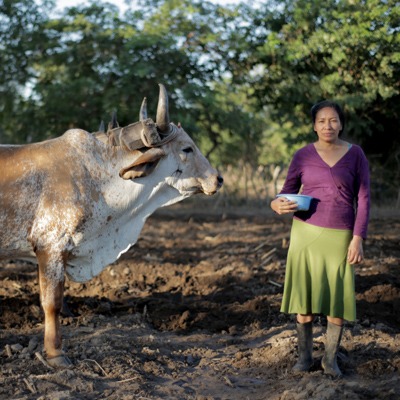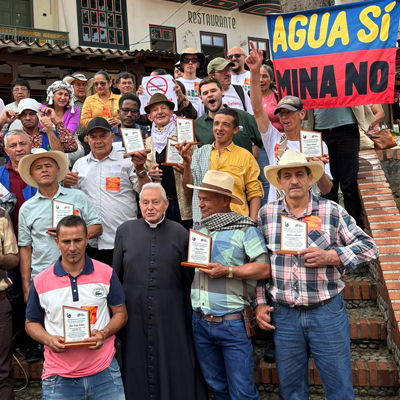Serious criticism of UN Food Systems Summit
A counter mobilisation will take place next week to boycott the official Pre-Summit
 Friends of the Earth International
Friends of the Earth International
“The UN Food Systems summit is a sham,” warned the Co-coordinator of the Food Sovereignty Program from Friends of the Earth International (FoEI), Kirtana Chandrasekaran.
“The Summit is claiming it will provide game changing solutions to transform food systems through its open and inclusive process. But if you dig just a bit deeper, the whole façade comes crashing down,” added the environmental activist in an interview with Real World Radio.
The UN Food Systems Summit will take place in September in New York, but from 26-28 July, the multilateral organisation will hold a series of Pre-Summit activities in Rome, Italy.
At the same time, from 25-28 July, over 500 peasant organisations, fisherfolk, indigenous peoples, workers, environmental justice and human rights activists, scientists and academics will gather for the “Peoples´ Counter Mobilisation to Transform Corporate Food Systems”, with both offline and online activities. They are calling it a “Counter-Summit” and the goal is to boycott the official UN space.
“Despite claims of being a ‘People’s Summit’ and a ‘Solutions’ Summit, UNFSS facilitates greater corporate concentration, fosters unsustainable globalised value chains, and promotes the influence of agribusiness on public institutions,” the organisers of the Counter-Summit stated in a press release issued on 19 July. “Resulting from a partnership between the UN and the World Economic Forum (formed by the world’s top 1000 corporations), the Summit is disproportionately influenced by corporate actors, and lacks transparency and accountability mechanisms.”
The UN Food Systems Summit “is a sham”,
So Friends of the Earth International warns on their website. The official Summit “is a thinly veiled attempt by corporations, philanthro-capitalists such as the World Economic Forum and the Gates Foundation and northern countries to place themselves at the centre of food governance, presenting false solutions to the problems they have created and perpetuate with impunity.”
In the interview with Real World Radio, Chandrasekaran expressed that “the whole Food Systems Summit has been deeply undemocratic and untransparent. We believe that the hidden agenda of the Summit is to really undermine the existing democratic, transparent multilateral spaces of the UN institutions such as the Committee on World Food Security (CFS), and replace that with what we call multistakeholderism, or some people call network multilateralism, which allows all different players, mainly business interests and corporations and other players such as academics, scientists and small scale producers to sit at the same table and devise solutions to food system problems. But we don’t all have the same responsibility for creating the problems, and we also don’t have the same rights that Governments need to uphold in how they solve these problems,” explained Chandrasekaran. This multistakeholderism “wipes out all the differences, power asymmetries, the historical injustices that have been perpetuated on communities by big corporations,” concluded the environmental activist.
The Co-coordinator of the Food Sovereignty Program at FoEI stated that the role of business interests and transnational corporations in the UN Summit causes that the solutions that are coming out of it are also “deeply problematic.” “A lot of them are based on corporate voluntary initiatives, most of them include market mechanisms rather than regulations, and a lot of them are simply just wrapping up existing corporate initiatives in a kind of new wrapping to present as shiny new solutions,” she criticised.
Friends of the Earth International stands with the food sovereignty and agroecology movement and solutions for system change, highlighting the work of small-scale food producers, who feed most of the world. “A real food systems transformation is possible.” “It includes tackling the power of corporations through binding regulations, stopping the use of agrotoxics and risky technologies, shifting public funding towards agroecology, and Governments that uphold and protect peoples’ rights including the Right to Food, to build social, economic, gender and environmental justice.”
“The entire process loses its legitimacy”
Meanwhile, Jordan Treackle, National Program Coordinator at the National Family Farm Coalition in the US, and part of La Vía Campesina and the Civil Society and Indigenous Peoples´ Mechanism (CSM) for relations with the CFS, was also critical of multistakeholderism. “Too often this multistakeholder approach twists the concept of inclusiveness by inviting civil society to a policy making process but not giving these grassroots constituencies the power to actually impact the final outcomes of that political debate. This is what we’ve seen throughout [the organisation of] the summit and is why our organisation has not participated in any official summit activities,” said Treackle in an interview with Real World Radio.
The leader also explained that, at a global level, “when multistakeholderism fails to address power asymmetries and prevent conflicts of interests, the entire process loses its legitimacy,” and “unfortunately, this has been the story of the Summit.”
According to Treackle, it is no accident that the official Summit has not placed the urgent need for systemic reform of the corporate food sector at the centre of the summit agenda. This shows that the Summit “is not truly intended to address these challenging problems linked to agribusiness. And this is not an accident, this is a political decision by the Summit leadership,” he added, explaining that the hundreds of social movements and organisations that have criticised the Summit many times and have officially expressed their concerns have not been “seriously addressed”.
“Suddenly, we learned that the UN Secretary General had signed an agreement with the World Economic Forum”
In March 2020, approximately 550 organisations expressed their concerns about the UN Food Systems Summit plans to partner with the WEF in a letter sent to UN Secretary General, António Guterres.
In October that year, the CSM launched an open call for engagement to “join forces and challenge” the UN Summit.
In November, Saúl Vicente, leader of the International Indian Treaty Council, told Real World Radio, on behalf of the CSM: “Suddenly, we learned that the UN Secretary General had signed an agreement with the World Economic Forum (WEF) to address food systems and hunger around the world, and was planning to convene a Food Systems Summit. This was concerning to us and we wanted to know why they were working with the WEF to begin with. There are spaces which have the mandate to address the issue of hunger in the world. One of these is the UN Food and Agriculture Organisation (FAO). But there is also an intergovernmental space which is part of the UN, the CFS, which has the mandate to address the issue of hunger in the world, review food systems and propose policies for governments to address these issues,” added Vicente.
On 8 February, 2021, on the occasion of the 47th Session of the CFS, Chandrasekaran, on behalf of the CSM Global Food Governance Working Group, warned that the UN Food Systems Summit is “giving a leading role to the corporate sector via the World Economic Forum,” without “upholding the rights and responsibilities of States, the rights of peoples.”
The following day, on 9 February, the CSM addressed the Chair of the CFS, Thanawat Tiensin, to urge him to redirect the course of the UN Food Systems Summit. “The CSM cannot jump onto a train that is heading in the wrong direction,” expressed the organisations that are part of the Mechanism.
From this Sunday 25 July to next Wednesday 28 July, the organisers of the “Peoples´ Counter Mobilisation to Transform Corporate Food Systems” will share their views on, amongst other things, a human rights- and agroecology-based food system transformation, focused on food sovereignty, small-scale sustainable agriculture and traditional knowledge.
This Counter Summit will serve to “really tell Governments that the people are watching them and we are not going to accept the outcomes from the Summit as valid,” concluded Chandrasekaran.





